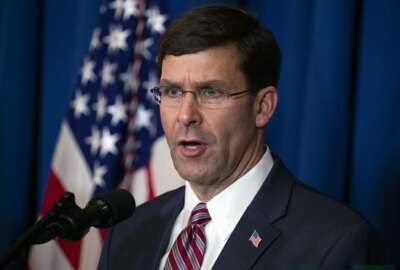
Interior touts success with forest fire prevention measures
In today's Federal Newscast, the Interior Department cleared brush and dead trees on double the amount called for in a 2018 presidential executive order.
To listen to the Federal Newscast on your phone or mobile device, subscribe in PodcastOne or Apple Podcasts. The best listening experience on desktop can be found using Chrome, Firefox or Safari.
- The Interior Department claimed progress in cutting the risk of out-of-control wildfires. Officials said crews reduced the fuel loads, cleared brush and dead trees on 1.4 million acres of land under Interior jurisdiction, twice as much as called for in a 2018 presidential executive order. This and related fire-mitigation actions are carried out by four agencies under the National Interagency Fire Center. Last year brought a below-average 48,000 of wild fires burning 4.6 million acres. (Department of the Interior)
- The Congressional Budget Office said the federal deficit is $39 billion higher in the first quarter of 2020 than in the first quarter of 2019. The total budget deficit for the quarter is $358 billion. CBO found that spending increased by 7%, while revenues only grew by 5%. The largest increase in the deficit was cause by spending in defense. That increase was $16 billion or a 10% increase compared to first quarter last year. (Congressional Budget Office)
- The Pentagon is ramping up its push to cut low-priority spending. Defense Secretary Mark Esper said a clean-sheet review of Defense agency spending has already found $5 billion the department can put toward higher priorities. In a memo this week, he announced three new measures to build on that progress across DoD agencies, combatant commands, and the military services. Among other things, he wants the military services to launch their own zero-based spending reviews. And he’ll personally oversee a review process for combatant commands. (Federal News Network)
- Two senators are hoping Defense Secretary Mark Esper will get behind the president’s commitment to a larger navy fleet. Maine Sens. Susan Colins (R) and Angus King (I) wrote to Esper, expressing their strong support for increasing the Navy fleet to 355 ships, as well as concern about recent reports indicating the Pentagon is considering requesting reduced funding for shipbuilding over the next several years. They’re not only worried about the effect it could have on national security, but also the impact it could have on the shipbuilding industrial base. (Sen. Angus King)
- Contractors hired by the Defense Department to move service members’ personal items during permanent changes of station missed their delivery day in cases reviewed by the DoD Inspector General. U.S. Transportation Command’s Defense Personal Property System reported 21% of all domestic shipments had at least one damage claim in 2018. The statistic is just the latest in a slew of issues with DoD’s moving process. All of this comes as Congress added new requirements to TRANSCOM’s household goods contract, which will pare down the 950 vendors DoD uses to ship service members’ personal items down to just one entity overseeing multiple subcontractors by 2021. (Federal News Network)
- President Donald Trump plans to nominate attorney John Chase Johnson to serve as the Federal Communications Commission’s next inspector general. Prior to his current job as a commercial litigation and government contracting attorney, Johnson served as a military judge in the Marine Corps Reserves. If confirmed, he’ll take over for current IG David Hunt, who has appointed inspector general in January 2011 but has served in an acting capacity since June 2009. (White House)
- The Department of Homeland Security and its inspector general are at odds over the agency’s efforts to modernize its financial management system. The IG released a report giving DHS credit for implementing 29 lessons learned from its four previous failed attempts. DHS took exception though to the IG’s comments saying previous attempts wasted millions of dollars, saying it’s misleading especially to those outside of DHS. The agency also says the results of the two-year effort don’t add any value to the current financial systems modernization effort. (Department of Homeland Security Office of Inspector General)
- Access to Trump Hotel documents has sparked another dispute between the General Services Administration and Democrats on the House Transportation and Infrastructure Committee. Committee members said GSA failed to respond to a subpoena for documents. GSA said it agreed to let them view sensitive financial records, but said lawmakers turned down an agreement not to publicly release them without GSA approval. Committee Chairman Peter DeFazio has asked GSA Administrator Emily Murphy to explain the agency’s rationale at a public hearing. (Federal News Network)
- Sen. Jerry Moran (R-Kan.), the new chairman of the Senate Veterans Affairs Committee, and ranking member Jon Tester (D-Mont.) are trying to untie top health professionals at the Department of Veterans Affairs from an old pay cap. They introduced the Competitive Pay for Leaders in Veterans Health Care Act, to correct an unintended consequence from a 2010 bill that was supposed help VA hire top health professionals. The legislation will specifically exclude Title 38 Senior Executive Service members from an existing salary cap. (Sen. Jerry Moran)
- Some Environmental Protection Agency employees are rallying behind a bill of rights as they head into bargaining negotiations with the agency. EPA American Federation of Government Employees members say they’re looking for assurance of whistleblower protections, the right to conduct climate change research and a fully-funded agency budget. AFGE said 90% of its EPA bargaining unit members don’t trust the agency will bargain in good faith with the union. EPA agreed to return to negotiations with AFGE after an arbitrator said the agency had originally bargained in bad faith. (American Federation of Government Employees)
- Interior won a protest of its mega telecommunications contract. The Government Accountability Office ruled in favor of the Interior Department’s award for data and IT services under the EIS contract. Interior chose CenturyLink in August to provide modern services under a 10-year, $12 million contract. In its protest, Verizon claimed Interior mis-evaluated its bid, which led to an unreasonable best-value tradeoff decision. CenturyLink’s bid was $10 million less than Verizon’s. GAO denied Verizon’s claim and dismissed its other complaints because they say the company could not provide all the services required at the time of the solicitation. (Government Accountability Office)
- A list of best practices looks to help agencies determine when new acquisition technologies are ready for prime time. A new Technology Readiness Assessment Guide from the Government Accountability Office looks to provide agencies a better understanding of technology maturity d a framework for conducting high-quality assessments. (Government Accountability Office)
- The Food and Drug Administration is seeking feedback from the public on its upcoming data strategy. The agency will hold a public meeting on the strategy at its campus in White Oak, Maryland,centurylinkin March. The strategy stems from a Technology Modernization Action Plan the agency launched in September, aimed at making the agency more adaptive to emerging technology. The agency will accept public comments on its strategy through the end of April. (Federal Register)
Copyright © 2025 Federal News Network. All rights reserved. This website is not intended for users located within the European Economic Area.
Eric White
Eric White is news anchor and Federal Drive producer at Federal News Network.
Follow @FEDERALNEWSCAST
Related Stories

Access to Trump Hotel documents sparks another dispute between GSA and Congress
Related Topics
All News
Angus King
CenturyLink
collective bargaining
Department of Homeland Security
EIS contract
Environmental Protection Agency
Federal Communications Commission
Federal Drive
Federal Newscast
Food and Drug Administration
General Services Administration
Government Accountability Office
Interior Department
John Chase Johnson
Management
Mark Esper
National Interagency Fire Center
Senate Veterans Affairs Committee
Susan Collins
Trump Hotel
Verizon
veterans health
whistleblower protections
Workforce




